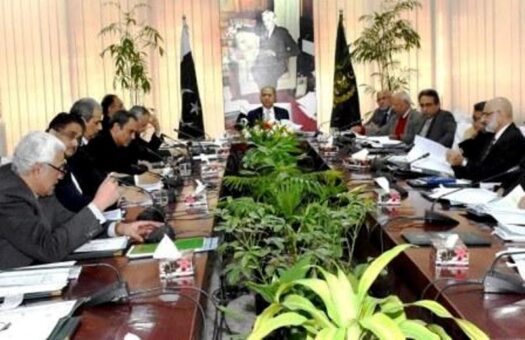ISLAMABAD: The government on Wednesday constituted a committee for hedging prices of imported petroleum products.
The formation of the committee was approved by Economic Coordination Committee (ECC) of the Cabinet, chaired by Adviser to the Prime Minister on Finance and Revenue Dr. Abdul Hafeez Shaikh.
The ECC set up a body headed by Special Assistant to Prime Minister for Petroleum Nadeem Babar to explore various call options for hedging prices for the petroleum products imported by Pakistan.
The ECC also gave go-ahead to a “full and final” human resource rationalisation plan for the Pakistan Steel Mills employees in accordance with the judgements and observations of the Supreme Court of Pakistan and other courts hearing the cases involving the PSM.
The ECC took up the proposal prepared by the Ministry of Energy in consultation with various international institutions and local partners for hedging prices for petroleum products being imported and decided to set up a Committee headed by Special Assistant to Prime Minister for Petroleum Nadeem Babar and including representation from SBP, PSO, Finance Division, Petroleum Division, Law Division and Planning Division to explore call option for 15 million barrels of oil for one or two years divided in 12 equal monthly amounts for different stock price above current Brent as long as fee is within acceptable range.
Under the TOR which can be readjusted by the Committee in the light of future developments, PSO will act as the counterparty while the Ministry of Finance shall give a guarantee of performance by the PSO.
OGRA would also be given the policy direction to include the monthly price of the Option in the cost of LNG or any other oil product chosen in announcing the monthly prices.
The ECC also discussed the reported shortage of petrol in some cities and asked the Ministry of Energy, Competition Commission of Pakistan and the OGRA to ensure the requisite stocks were maintained by the OMCs and the supply to the fuel stations across the country was regular and intact throughout the month.
Chairman ECC while taking a stern view of the reported petrol shortage directed all the relevant Government Ministries /Departments to immediately inform him if situation worsens any further.
On another proposal by the Ministry of Energy, the ECC considered and approved reimbursement of operational cost of Single Point mooring (SPM) installed by M/s Byco.
Under the decision BYCO would submit actual audited operating cost of the SPM (excluding Wharfage/FOTCO charges/crude saving) to OGRA for inclusion in IFEM subject to a cap of PARCO rate while OGRA shall determine the actual impact for inclusion in the IFEM on the ongoing basis.
Consequently with the implementation of the above decision, BYCO will withdraw its case from the Supreme Court of Pakistan and would also provide an undertaking that the ECC decision conclusively closes the pending matter of SPM’s costs.
On another proposal by the Ministry of Energy, the ECC asked the Finance Division to release an amount of Rs 1 billion to meet the cost over and above the criteria for supply of gas to villages and localities falling within 5 kilometres radius of gas producing fields as per instructions of the Supreme Court of Pakistan to implement an announcement of the Prime Minister made in September 2003 for supply of gas to villages and localities falling within 5 kilometres radius of gas producing fields.
The ECC also took up a proposal by the Ministry of Energy for payment of unrecovered fixed costs of Rs.43.7 billion to the IPPs and asked the Finance Division to release Rs 23 billion while the issue of remaining payments would be resolved by all the stakeholders within one week and would be taken up in the next ECC meeting.
During the meeting, the ECC also took up and approved 12 separate proposals for technical supplementary grants of various amounts from different divisions and departments, including Interior Division, NAB, Revenue Division, Cabinet Division, National Heritage and Culture Division, Finance Division, Federal Education and Professional Training, Communications Division and Religious Affairs and Interfaith Harmony Division.
